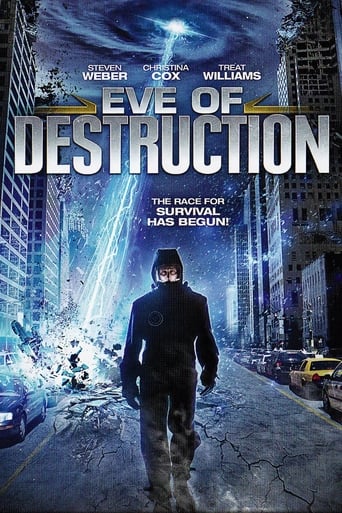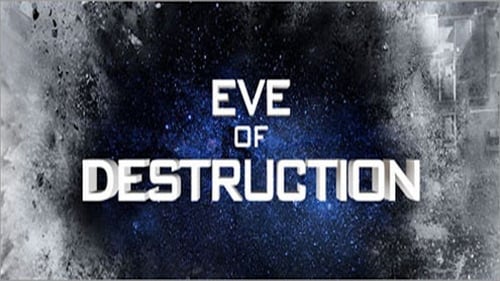Gin-ster
I see a lot of criticism here of the irrationality of the plot and its anti-science tone. I agree that the plot was irrational, and also, that the scientists didn't behave like real ones. Yet I don't mind the nonsensical nature of the threat - after all, isn't that always the case when disaster on a global scale is the threat? (i.e. mega-volcanoes, shift in earth's magnetic field, alien invasions, zombies, etc.?)It's always necessary to suspend disbelief or it's impossible to watch anything of this genre. As to showing scientists negatively, I didn't get that sense as much as showing an attack on the real villain here, "corporate greed." The driving force behind all the "wrong-headedness" was the corporate head of the project, played with scenery-chewing glee by Treat Williams. If I have any complaints about its political correctness, I'd say it also threw a barb at "occupy Wall Street" and Greenpeace, and the symbol of greed (i.e. Williams' role) had a Jewish name, which was admittedly something I had to keep overlooking.Why my relatively high rating? First, the surprisingly affecting back-story of the Russian lineman, along with good unusually good acting for this level of movie, by the Russian character, his wife, the lead scientist and the main protagonist, played by Steven Weber. His eye-rolling teen daughter was fairly well played too, given the clichéd nature of this role (you could interchange her with the daughter in "Under the Dome.") Also, and here is the real spoiler: did the world come to an end? Well, not entirely, but the lack of clarity on that was in itself unique (we only know that Denver, Paris, London and the Pyramids took direct hits) - so the lack of "finality" is unusual for this type of film. And on a related note, from the first 10 minutes I had been expecting the real villain, the corporate CEO played by Treat Williams, and the scientist who prostituted herself to him, to be zapped into smithereens by "dark energy," by the end of the film, as a sort of divine justice for their blindly going ahead with the project they knew to be destructive. So ... SPOILER SPOILER SPOILER big surprise, NOTHING happens to them. This is the long way of saying that despite a lot of apparent clichés, in the end, this was not your typical "B" sci fi movie - it was not all that predictable - and that is what accounts for my relatively higher ratings, along with surprisingly nuanced performances by some case members (i.e. Steven Weber) amidst some stock-villain types.
innocuous
But you have to love them.Sometimes you get movies that are well-written and challenging (e.g., "Primer"), but with budget effects and sets. Then you get "Eve of Destruction," which is exactly the opposite. Relying on 1960s "Star Trek" physics, this movie actually spent some time on locating or creating the sets, and the effects are not nearly as bad as some other reviewers would have you believe. And it is the ONLY movie I can recall where you get to see someone drill through a telephone pole. (It's always been simulated drilling in other films.)My favorite scene is when the two Nobel-laureate physicists decide the answer is to create a "denser vacuum." I'm pretty sure that they mean a vacuum with LESS average density or mass, since there's no vacuum existing at that time, but we get by that fairly quickly. And they never seem to question why using their apparatus to do something over HERE, makes bad things happen about two miles over THERE.My second favorite scene is when an eco-terrorist "occupy" movement is broken up by riot police. As far as I could see, there were exactly two riot police (though both of them were costumed very nicely).If I had a son and wanted to encourage him to go into physics, I would show him this film. It would go something like this:"See! All the women you meet will have really nice breasts and great cleavage.""But, Dad, they're all either evil or misguided!""Yes, which is why we need more male physicists."Check it out!
canuckteach
This presentation was a mess from beginning to end (thank goodness I had the PVR to fast-forward the commercials). Parts and characters are not re-connected, suspense is supposed to come from the fact the none of the characters (parents or teens) can communicate properly, and the action frequently grinds to a halt to allow people to express their otherwise suppressed feelings for one another. Along with all this, the plot line as expressed in the guides (and at IMDb) is INCORRECT. It is stated 'when two scientists attempt to discover unlimited energy, their experiment is hijacked and sabotaged by eco-terrorists. The result is a dark energy black hole that could destroy the planet. ..' ** Spoiler ** The experiment is NOT hijacked by Eco-terrorists - their role in the experiment mishap is very limited, but they do fashion some minor sabotage at a power sub-station. The threat to the planet is caused by some very stupid scientists, and some extremely lax supervision by the local authorities, when an energy firm starts tampering with some powerful forces that have already gone wrong elsewhere.No sustained action, crummy dialogue, inexplicable ineptness and decision-making by supposedly smart people make this 2-parter a prime candidate for a pass. Try any Brit suspense series instead for none of the above.
nowego
After sitting though this hoping it was going to improve or grab me in some way it is easy to see why the rating for this is so low.Very average disaster fare IMO.Nothing special to make you want to sit through 180 minutes of average special effects and average acting. I did it to be able to write this review. The "been there done that" memories were raging all the way through this, lots of standard good guy bad guy cliques.Bad guy greedy company owner tries to go against all the recommendations that they shouldn't to do what they want to do, small environmental protest group interferes and disaster ensures.Bad guys escape justice at last minute, good guys overt complete catastrophe and life gets back on track. Only 500,000 people we never see have died.The End.




